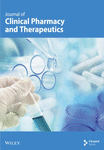A prospective analysis of clinical pharmacy interventions on an acute psychiatric inpatient unit
Abstract
A standardized data collection form was developed to enable uniform documentation of all clinical pharmacy interventions undertaken for an acute-care, psychiatric inpatient population during a 6-month study period. This information included demographic data as well as details of the drugs involved, the nature of the drug-related problems, the type of intervention and an estimate of the significance of the intervention. A total of 204 clinical interventions were proposed for 69 patients (mean age 66·8 years, range 28–85 years). The proposed interventions were accepted by medical staff in 187 (91·7%) instances. Antidepressants were the class of drug most often generating clinical interventions (34·7% of total interventions). The most common type of intervention was a recommendation for the commencement of drug therapy (28·8%), followed by recommendations for enhanced patient monitoring (23·5%). In 20·3% of cases the interventions were estimated to be of major significance. This study suggests that the provision of clinical pharmacy services in the acute-care, adult, psychiatric setting has the potential to generate a considerable range of interventions aimed at optimizing treatment outcomes.




